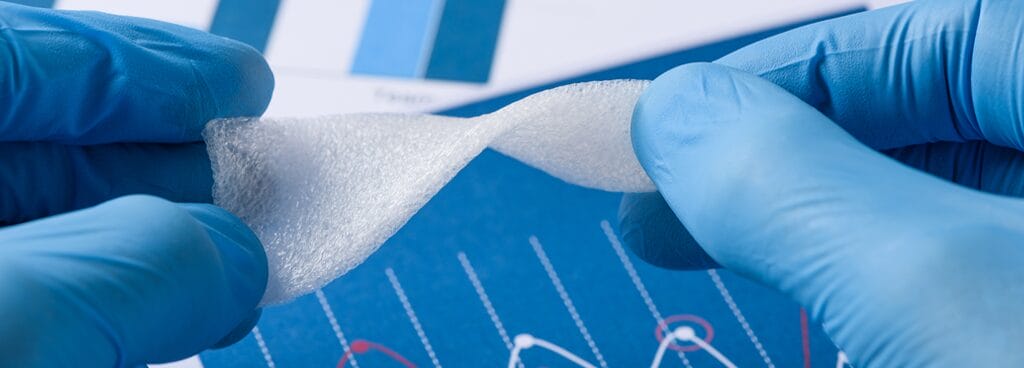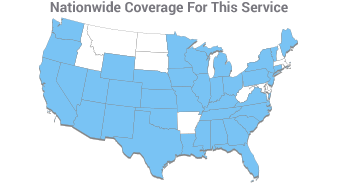- Home
- Services/IndustriesServicesindustries
- About Us
- LocationsStatesAccordion ContentAccordion ContentAccordion ContentAccordion Content
- Job Openings
- Quick Links
- ATS Family

ASTM F1839
The Applied Technical Services Family of Companies (FoC) tests the mechanical properties of polyurethane foam according to ASTM F1839 in our polymer testing lab. Solid polyurethane foam makes a testing block for medical screws, as the density of the foam block may resemble the density of spongy and porous cancellous bone. The ASTM F1839 standard describes mechanical test methods to assess if a sample has the appropriate composition and properties for medical testing.
Benefits of ASTM F1839 Testing
The mechanical tests in ASTM F1839 help manufacturers make informed decisions about their foam products. Our clients request foam testing for quality control, research and development, and reliable analysis. ASTM F1839 uncovers the properties and behaviors of the polymeric foam, such as composition, density, dimensional stability, compressive strength, compressive modulus, shear strength, shear modulus, and pullout load.
Medical Device Testing and ASTM F1839
ASTM F1839 is an FDA Recognized Consensus Standard for orthopedic testing of Class 2 devices. Before testing the performance of a metallic medical screw or implant, biomechanical engineers may use ASTM F1839 to evaluate the grade and characteristics of the proposed polyurethane foam testing medium. Insufficient foam density or rigidity may impact the values derived in related testing standards, such as:
- ASTM F543 – Test Methods for Metallic Medical Bone Screws
- ASTM F2502 – Test Methods for Absorbable Screws and Plates for Internal Fixation Implants
State-of-the-Art ATS Testing Labs
ATS FoC polymer labs provide material and mechanical testing services for optimized polymer analysis. Our testing equipment can deliver:
- Compressive forces from 0.22 lbf to 10,000 lbf
- Temperatures as low as -100 ˚C to as high as 350 ˚C
Shear Test
In a shear test, our experts intentionally produce a sliding failure by applying opposing forces parallel to the product’s surfaces until the foam fails or deforms. We use shear tests to determine the maximum shear stress the foam endures before deforming and understand the material’s rigidity. Ultimately, our clients can use shear test results to decide if the material can endure the shear stresses the foam would be subjected to during medical device testing.
Compression Test
The ATS FoC can also perform the mechanical compression test described in ASTM F1839. A compression test involves subjecting the foam specimen to opposing forces that press inward until the sample yields or meets a predetermined compression limit. Our equipment can deliver a uniform load for accurate thickness measurements and compression strength calculations.
The compression test indicates the maximum compressive stress a foam endures before permanent deformation or failure. Our experts can extrapolate from the compression test whether the polyurethane foam has the qualities to act as a reliable testing medium for devices intended for cancellous bone. We also offer compression testing according to other standards, such as ASTM D695.
Screw Pullout Test
A screw pullout test helps determine the maximum force needed to remove a screw from the polyurethane foam. Our clients may use the test results to compare designs or ensure uniformity before performance testing the medical device.
About Applied Technical Services
The Applied Technical Services Family of Companies (FoC) provides consulting engineering, calibration, testing, and inspection services for a wide range of clients. Some of the industries we regularly support include medical, manufacturing, and automotive. The wide breadth of our capabilities allows ATS to assign experts best suited to fulfill a client’s specific needs with a quick turnaround rate and effective analysis.
ATS operates several A2LA-accredited labs for mechanical, chemical, electric, and nondestructive testing, and calibration. We meet the ISO 9001:2015 requirements for a Quality Management System certification.
Contact Us
Call +1 (888) 287-5227 or complete the form on this page to request ASTM F1839 mechanical testing from ATS. Please direct questions to our customer service representatives by phone. They will gladly provide further information about how ATS can help you.

Request Form
"*" indicates required fields
Polymer Testing
- FTIR Analysis of Polymers
- GPC Polymer Characterization
- Melt Flow Index Testing
- Plastic and Elastomer Analysis
- Plastic Material Testing
- Plastic Material Testing Lab
- Plastic Testing Lab
- Plastic Tensile Strength Testing
- Plastic Tensile Testing
- Polymer Analysis Lab
- Polymer Characterization Lab
- Polymer Composition Analysis
- Polymer Failure Analysis
- Polymer Fatigue Testing
- Polymer Foam Testing
- Polymer Hardness Testing
